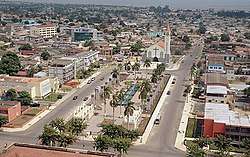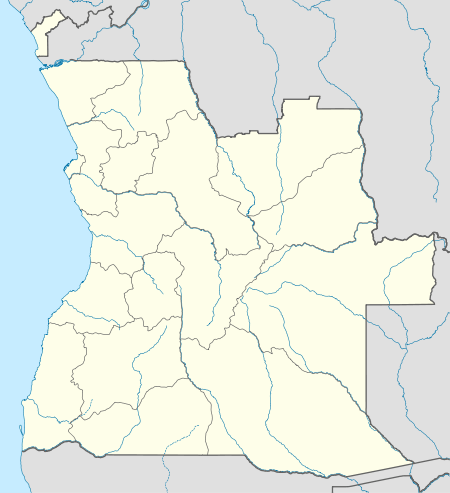Cabinda (city)
| Cabinda Tchiowa Cidade de Cabinda | ||
|---|---|---|
| Municipality and city | ||
 The Chapel of Rainha do Mundo in the City of Cabinda | ||
| ||
 Cabinda Location in Angola | ||
| Coordinates: 5°33′36″S 12°11′24″E / 5.56000°S 12.19000°ECoordinates: 5°33′36″S 12°11′24″E / 5.56000°S 12.19000°E | ||
| Country |
| |
| Admin. division | Cabinda province | |
| Founded | 1883 | |
| City Status | 1956 | |
| Area | ||
| • Total | 1,823 km2 (704 sq mi) | |
| Elevation | 24 m (79 ft) | |
| Population (2014 Census) | ||
| • Total | 598,210 | |
| • Density | 330/km2 (850/sq mi) | |
| Climate | Aw | |
Cabinda (Kongo: Tsiowa) is a city located in the Cabinda Province, an exclave of Angola. Angolan sovereignty over Cabinda is disputed by the secessionist Republic of Cabinda. The municipality of Cabinda covered 1,823 square kilometres (704 square miles) and contained 598,210 inhabitants in 2014. The residents of the city are known as Cabindas or Fiotes. Cabinda, due to its proximity to rich oil reserves, serves as one of Angola's main oil ports.[1][2]
History
The city was founded by the Portuguese in 1883 after the signing of the Treaty of Simulambuco in 1983 the same period that occurred the Berlin Conference.
There are considerable offshore oil reserves nearby.
Geography
Cabinda is located on the Atlantic Ocean coast in the south of Cabinda Province, and sits on the right bank of the Bele River.[1] It is 56 kilometres (35 mi) north of Moanda (DR Congo), 70 kilometres (43 mi) north of Congo River estuary and 137 kilometres (85 mi) south of Pointe-Noire (Rep. Congo).[3]
Districts
The city of Cabinda is divided into three districts, or comuna:
- Cabinda, the city seat, with 88.6% of the population the city
- Malembo, with 3.1%
- Tando-Zinze, with 8.3%[4]
Education
Universities:
- Universidade 11 de Novembro
- Universidade Lusíada
- Private University of Angola
- Instituto Superior de Ciências da Educação de Cabinda
Language
Ibinda, a Bantu language, is the primary language of both the city and province of Cabinda.[2] Portuguese, the official language of Angola, is also spoken, though mostly as an administrative role. Since Cabinda was colonized relatively later (late nineteenth century) by Portugal compared to most of Angola, Portuguese isn't as widely spoken, though language speakers are rapidly growing in number.
Transport
In 2012, a proposed railway connection to the main Angolan system has to cross territory of the Democratic Republic of the Congo.
See also
References
- 1 2 "Cabinda". Encyclopædia Britannica. Encyclopædia Britannica Inc. 2014. Retrieved 2014-06-21.
- 1 2 "Cabinda" (in Portuguese). Luanda, Angola: Info-Angola. 2014. Retrieved 2014-05-21.
- ↑ Google. "Cabinda (city)" (Map). Google Maps. Google.
- ↑ "Region 1: Cabinda". Postcode Query. 2014. Retrieved 2014-06-21.
Bibliography
External links
| Wikisource has the text of the 1905 New International Encyclopedia article Cabinda. |
- Profile of Cabinda Municipality (in Portuguese)
